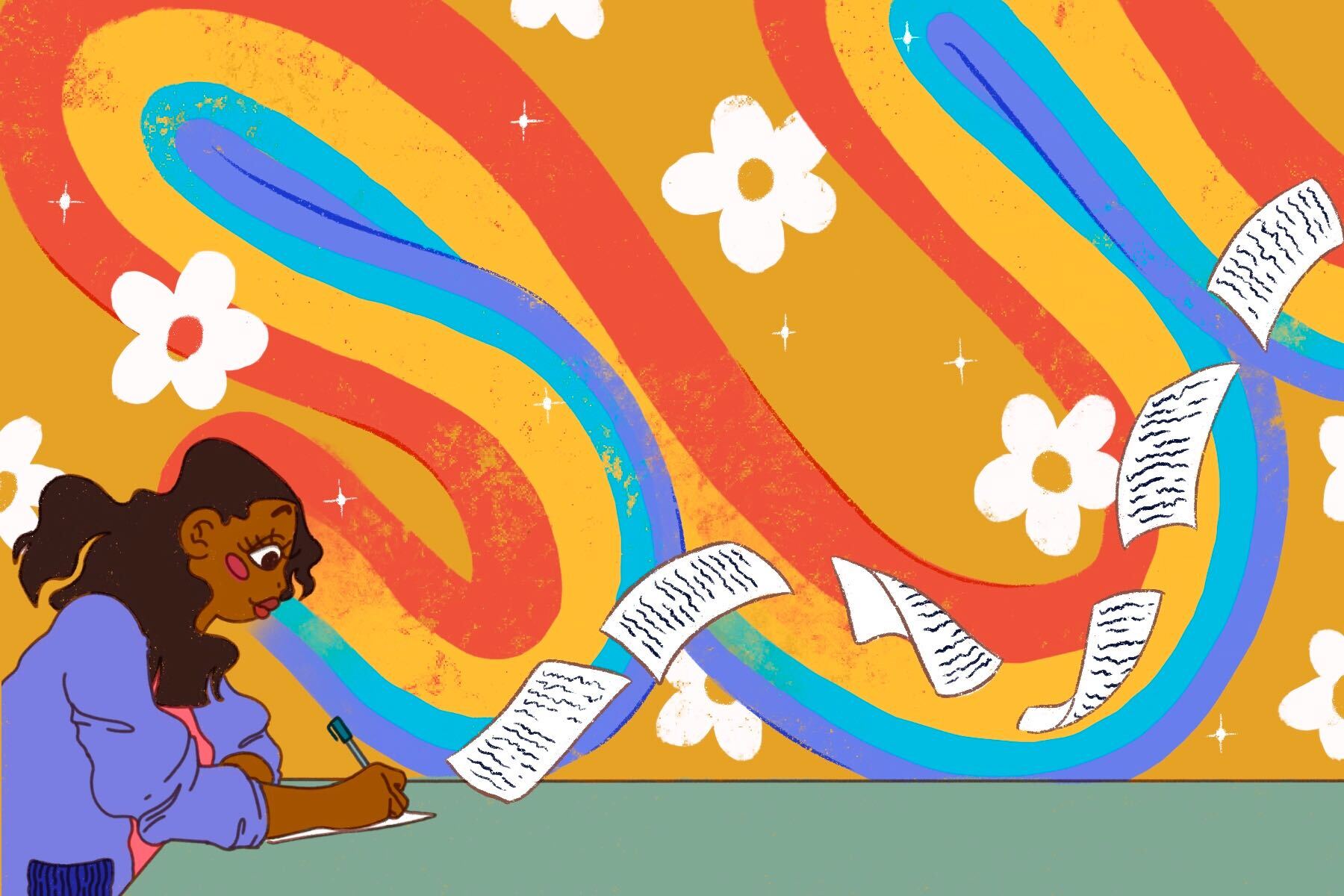As a writer, it is tempting to think that more free time during quarantine means being able to get a whole lot more writing done. However, many writers have discovered that the opposite is true. Being stuck at home during a pandemic means that writer’s block is at an all-time high for many people.
While struggling to put words on paper is frustrating, there are plenty of concrete ways to combat writer’s block. Free writing is one of the most powerful, yet often overlooked tools to help writers clear their heads and open themselves up to new ideas. If done properly, the practice is incredibly effective at easing writer’s block by helping writers focus and free themselves from their inner critics.
Free Writing and the Subconscious Mind
According to the Collins English Dictionary, “free write” means “to write (something) freely without stopping or thinking.” The practice gives an author permission to write whatever comes to mind. The writer has the freedom to put down anything and everything without second guesses or judgment, which is a freedom that writers rarely grant themselves.
By writing their stream of consciousness, writers can discover what is lurking in their subconscious mind. Screenwriter and actor Steve Martin has said, “The conscious mind is the editor, and the subconscious mind is the writer. And the joy of writing, when you’re writing from your subconscious, is beautiful – it’s thrilling. When you’re editing, which is your conscious mind, it’s like torture.” Thus, free writing allows the writer to mute their conscious “editor” and fully tune into the “writer” in their subconscious.
Writer’s block can certainly feel like “torture” in the way Martin describes. Writer’s block often emerges as a protective mechanism against judgment; by giving into writer’s block, an author prevents themselves from having to go through the “torture” of critiques from themselves and others. It is much easier to say that you are stuck than push through and write something that you are not entirely confident in. Doing so means facing the inner critic who knows you are struggling to succeed.
Writer’s block isn’t so much about being unable to come up with ideas, but about being resistant to the difficult process of editing and self-criticism. Free writing helps liberate the writer from the editor in their mind.
The subconscious mind holds the ideas that you truly want to write about and how you want to go about writing them. If you are stuck engaging with the judgmental editor inside your brain, it is impossible for you to even get a glimpse of what the subconscious mind contains. Free writing helps writers access ideas that they may never have discovered if they were trying to “come up with” something to write about. Consequently, getting in touch with the subconscious mind can inspire the beautiful and thrilling writing experience that Martin describes.
The Science Behind Free Writing
Not everyone fully buys into the idea of a subconscious mind. Even if you are one of these people, you should not discount the power of free writing. Free writing has been scientifically proven to help writers focus and gain confidence in their writing abilities.
In 2006, researchers conducted a study at the University of Canberra about using free writing to help develop academic writing. The researchers found that free writing exercises helped students develop a deeper understanding of how to produce high quality academic writing. Through free writing, students allowed themselves to look inward and explore what writing a good paper meant to them. It also helped them clarify what effective academic writing meant in the context of their university’s expectations.
In turn, free writing helped the students approach academic writing feeling newly empowered by what they discovered. The students became confident in their abilities to produce high quality academic writing in a way that they were not before they engaged with free writing exercises. Free writing brought more clarity and courage to students when they wrote academic papers moving forward.
Additionally, free writing has been proven to help regulate emotions. For example, writing about stressful or traumatic experiences can help lessen people’s anxiety surrounding those incidents. Regulating emotions through free writing can help writers clear their heads and get rid of the emotional blockage that is making it difficult for them to focus.
Tips and Tricks for Effective Free Writing
Following these guidelines will ensure that your free writing is as effective as possible in combating writer’s block.
1. Write Nonstop
Stopping presents the opportunity for your inner critic to emerge. By writing nonstop, you allow your subconscious mind to fully take over. You also avoid confrontations with the judgmental editor in your brain. Even if you have to write “I don’t know” over and over for a while, do not physically stop writing no matter what. New thoughts will come to you eventually.
2. Use A Timer
By using a timer, you will not be distracted by having to decide if and when to stop. Also, you will not be tempted to stop just because you do not know what to write down. Setting the timer for anywhere between 5-15 minutes is a good time frame for new free-writers. Anything shorter might make it hard to fully delve into the process, while anything longer might be too much for your brain to handle at once. You can always do multiple sessions of timed free writing, but make sure to take breaks in between.
3. Do Not Censor Yourself
Whatever comes to mind, write it down. Even if something doesn’t seem to make sense or does not connect to the previous idea you fleshed out, write it down anyway. Allowing yourself to write without editing is the only way to free yourself from your own criticism. By doing so, you can unlock new and exciting ideas without worrying about their quality or clarity.
4. Do Not Think of It As Brainstorming
Free writing is similar to brainstorming in that it can help writers discover new ideas. However, brainstorming still involves the stopping, thinking and editing that free writing avoids. Treat free writing as an exercise that has no end goal, rather than as an exercise for coming up with ideas. While free writing often does help writers find ideas, it is okay and still effective if it doesn’t. Free writing can still help writers clear their heads and focus.
5. Use a Pen and Paper
Putting pen to paper has been scientifically proven to aid productivity and creativity. In fact, studies using MRI show that handwriting actually increases neural activity in parts of the brain in a way that is similar to meditation. Writing longhand is more physically engaging than typing, meaning more of your body is focused on the act of writing. Additionally, being away from a screen means you are less likely to become distracted.
6. Use a Prompt
It would be difficult to write nonstop without any guidance. Find a prompt that best suits your needs, whether you are trying to come up with a creative idea, formulate an academic paper or are just stuck on a particular section of any sort of writing project. Prompts can be as simple as “I want to write about…” to help with creative writing, or “I want to argue that…” to help with academic writing. If you get stuck during the free write, you can always return to the prompt.
Don’t be afraid to experiment with prompts that may not directly relate to your specific project. Seemingly irrelevant prompts may actually lead you to new ideas and free you from whatever writing rut you find yourself in.
You can find countless writing prompts on all different topics online. Here are 101+ Writing Prompts To Conquer Writer’s Block to get you started.
7. Save Your Free writing and Look Back At It
You never know when an idea you scribbled out during a free writing session will help you later on. Save your free writing so you can refer to it while working on current and future writing projects. Something that doesn’t stand out to you now might be exactly what you need to help you move forward with a writing project down the line.
The next time you experience the pain of not knowing what to write or how to write it, don’t let the feeling overwhelm you. Turn to free writing to conquer writer’s block and open up your mind to new discoveries.

















